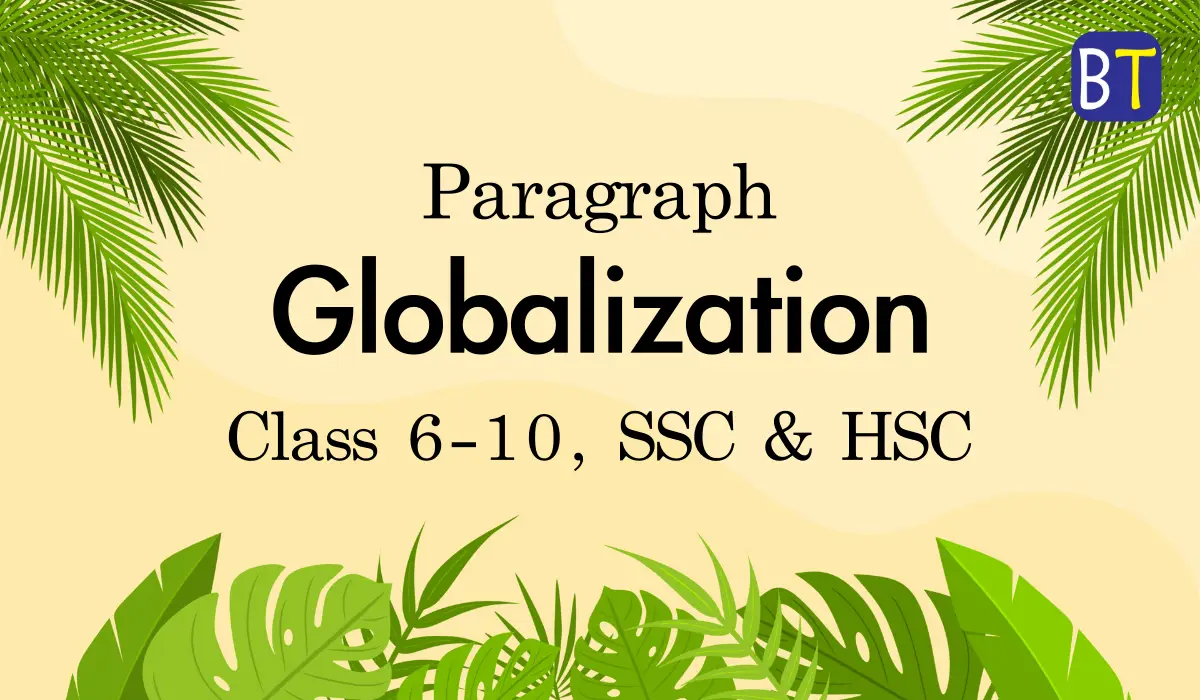Globalization refers to the interconnectedness of economies and societies through international trade and communication. It has led to the integration of markets, cultures, and technologies worldwide.
Globalization has transformed how businesses operate, creating new opportunities for growth and competition in the global marketplace. Additionally, it has also led to the exchange of ideas and collaborations across borders, contributing to advancements in technology and innovation. Globalization has both positive and negative impacts on economies, stirring debates about its effects on labor markets, income inequality, and cultural homogenization.
However, it is clear that globalization has brought about significant changes in the way the world functions and continues to shape the future of international relations and global economies.
Globalization Paragraph 100 Words
Globalization has become an undeniable force in our interconnected world. With the advent of technology and increased mobility, the boundaries between countries are gradually disappearing. This phenomenon has led to a myriad of opportunities and challenges for individuals, businesses, and governments alike.
One of the key aspects of globalization is the exchange of ideas and cultures. People from different corners of the world can now easily connect with each other, fostering a sense of global community. This has not only led to the spread of knowledge and innovation but has also given rise to cultural diversity and acceptance.
Furthermore, globalization has opened doors for companies to expand their operations across borders. This has resulted in an interconnected global economy, where goods and services are traded on a global scale. While this has increased competition, it has also provided consumers with a wider range of choices and access to new markets.
However, globalization is not without its challenges. It has contributed to income inequality and the displacement of certain industries and jobs. Moreover, it has raised concerns about the exploitation of resources and the environment. In conclusion, globalization is a complex and multifaceted phenomenon that has both positive and negative implications.
As our world continues to evolve, it is important for individuals and societies to adapt and navigate the challenges and opportunities that come along with it.
Globalization Paragraph 200 Words
Globalization is a concept that has dramatically shaped the world we live in today. It refers to the interconnectedness and interdependence of countries, economies, and cultures across the globe. The effects of globalization can be seen in various aspects of our lives, including trade, communication, and travel.
One significant impact of globalization is the increased movement of goods and services across borders. International trade has become a vital part of many economies, as countries seek to leverage their comparative advantages and participate in the global marketplace. Furthermore, globalization has facilitated the exchange of ideas and knowledge.
Advances in technology, particularly in the field of communication, have made it easier for people from different parts of the world to connect and share information. This exchange of ideas has fostered innovation and cultural enrichment. However, globalization has also brought about challenges.
Economic disparities between countries have become more apparent, leading to concerns about inequality and exploitation. Additionally, cultural homogenization and the loss of traditional practices are some of the downsides associated with globalization. In summary, globalization is a complex and multifaceted phenomenon that has both positive and negative impacts.
It has transformed the world into a global village, connecting people and nations like never before. Understanding its implications is crucial for navigating the challenges and opportunities it presents.
Globalization Paragraph 250 Words
Globalization has become a ubiquitous phenomenon in today’s interconnected world. It has revolutionized the way businesses operate and has brought significant changes to various industries. The interconnectedness of the global economy has led to the free flow of goods, services, and capital across international borders, resulting in increased trade and investment opportunities.
Moreover, globalization has also facilitated cultural exchange and has influenced societal norms and values. However, it has also sparked debates regarding its impact on local economies and the environment. Despite the controversies surrounding it, globalization continues to shape the modern world in profound ways, influencing everything from technology to trade, and even impacting individual lifestyles.
Globalization Paragraph 300 Words
Globalization has significantly impacted the world economy and culture, leading to interconnectedness among countries. The integration of economies through trade, investment, and technology has resulted in both opportunities and challenges. Globalization has facilitated the exchange of goods, services, and ideas on a global scale, leading to economic growth and cultural exchange.
However, it has also raised concerns about unequal distribution of wealth, environmental degradation, and loss of cultural identity. Despite the criticism, globalization has fostered innovation, improved living standards, and created a global community. The ongoing debate surrounding globalization underscores the need for responsible and inclusive global economic policies to ensure sustainable development and shared benefits for all nations.
Globalization Paragraph 350 Words
Globalization is a phenomenon that has engulfed the world in recent years. It refers to the increasing interconnectedness and interdependence of countries through the exchange of goods, services, information, and ideas. The process of globalization has been driven by advancements in technology, particularly the widespread use of the internet and the development of transportation systems.
These developments have made it easier for businesses to operate on a global scale and for individuals to connect with each other from different parts of the world. Globalization has had both positive and negative impacts on economies, societies, and cultures.
On the positive side, it has led to increased economic growth, improved living standards, and greater cultural exchange. However, it has also brought about challenges, such as widening income inequality and the loss of traditional cultural practices. Despite the controversies surrounding globalization, it is a force that cannot be ignored in today’s world.
As the world becomes increasingly interconnected, it is crucial for nations to adapt and find ways to mitigate the negative consequences while maximizing the benefits of globalization.
Globalization Paragraph 500 Words
Globalization has become an undeniable force in today’s interconnected world. The term refers to the increasing integration and interaction between different countries and economies. Trade, communication, and technology have played major roles in driving this phenomenon. With globalization, barriers to international exchange have been greatly reduced, making it easier for goods, services, and ideas to flow across borders.
This has led to economic growth and development in many parts of the world. However, globalization is not without its challenges. Critics argue that it has widened the gap between the rich and the poor, caused job losses, and threatened cultural diversity.
Additionally, global challenges such as climate change and pandemics require countries to work together in finding solutions. In conclusion, globalization is a complex and multidimensional process that has both positive and negative effects on societies and economies globally. It is important for policymakers to navigate these challenges and ensure that the benefits of globalization are shared by all.
Globalization Paragraph For Class 10 (ssc)
Globalization is a concept that has significantly impacted the world in various ways. It refers to the increasing interconnectedness and interdependence of nations through the exchange of goods, services, and information. Globalization has had a profound influence on economies, cultures, and societies around the globe.
Class 10 (SSC) students studying this topic gain valuable insights into the positive and negative aspects of globalization. They learn about the advantages of access to a wider range of products, services, and opportunities, as well as the challenges posed by issues such as economic inequality and cultural assimilation.
It is essential for students to critically analyze the effects of globalization and develop a well-rounded perspective. By examining case studies and real-world examples, they can better understand how globalization impacts various stakeholders, including individuals, communities, and nations. Overall, studying globalization equips students with the knowledge and skills needed to navigate an increasingly interconnected and complex world.
Globalization Paragraph For Admission
Globalization is a concept that has gained significant attention in recent years. It refers to the increasing interconnectedness and interdependence of countries through the exchange of goods, services, information, and ideas. In the context of admission, globalization has become an important factor to consider.
With the world becoming more integrated, admission processes must adapt to this global landscape. Institutions now evaluate applicants from diverse backgrounds and cultures, recognizing the value of diversity in their student body. This has led to a shift in the criteria used for admission, with a greater emphasis on a global perspective and cross-cultural understanding.
Students who can demonstrate their ability to thrive in a globalized world have a competitive advantage in the admission process. Therefore, it is crucial for prospective students to showcase their international experiences, language skills, and cultural sensitivity when applying for admission to educational institutions.
By recognizing the impact of globalization, admissions committees can select candidates who are best prepared to succeed in an interconnected and rapidly changing global society.
Globalization Paragraph Short
Globalization has become an integral part of the modern world, shaping economies, cultures, and societies. With the advancement of technology and communication, the interconnectedness of nations has grown exponentially. This interconnectedness has led to the exchange of goods, services, ideas, and cultures across borders, resulting in a more interconnected global community.
However, globalization has also sparked debates about its impact on local economies, cultural homogenization, and environmental sustainability. Despite the criticisms, globalization has opened up new opportunities and possibilities for businesses, individuals, and nations to collaborate and thrive in a globalized world.
Embracing this interconnectedness while addressing its challenges is crucial for navigating the complexities of globalization in the 21st century.
Globalization Paragraph Long
Globalization has become an integral part of today’s interconnected world. Its far-reaching impact can be seen in various spheres of life, including economics, culture, and technology. The process of globalization has led to the integration of economies, as well as the exchange of ideas and innovations on a global scale.
This interconnectedness has transformed the way businesses operate and has allowed for greater collaboration and cooperation across borders. Additionally, globalization has facilitated the spread of cultural influences, leading to a more diverse and interconnected global community. With the advent of technology, communication and information sharing have become more accessible, further accelerating the pace of globalization.
As the world becomes increasingly interconnected, it is essential to understand and adapt to the opportunities and challenges presented by this global phenomenon.
Globalization Paragraph Class 6
Globalization is a phenomenon that has greatly impacted our world today. It refers to the process of integration and interconnectedness between countries and people around the globe. Globalization has brought about increased trade, cultural exchange, and technological advancements. It has made the world more interconnected and interdependent, allowing for the flow of goods, services, ideas, and information across borders.
In the context of class 6, globalization can be understood through the lens of how it affects different communities and their interactions with each other. It opens up opportunities for people to learn about different cultures, traditions, and ways of life, fostering a sense of global citizenship.
However, globalization also has its challenges, such as the potential for widening economic inequality and cultural homogenization. Nonetheless, it is an important concept to understand and navigate in today’s increasingly globalized world.
Globalization Paragraph For Hsc
Globalization, the interconnectivity and integration of countries through various economic, political, and cultural processes, has become a significant global phenomenon. With the advancements in technology and communication, the world has become more interconnected than ever before. Globalization has had both positive and negative impacts, leading to an ongoing debate regarding its effects on societies, economies, and cultures.
On one hand, globalization has facilitated the exchange of goods, services, and ideas, allowing for economic growth and development. It has opened up new markets and opportunities for businesses and individuals, leading to increased trade and investment. Additionally, globalization has fostered cultural exchange, allowing people from different parts of the world to learn from and appreciate diverse cultures.
On the other hand, globalization has also resulted in various challenges. Economic disparities between developed and developing countries have widened, leading to social and political issues. Moreover, globalization has often been criticized for its negative impact on the environment and local cultures.
In conclusion, globalization is a complex and evolving process that has impacted societies, economies, and cultures globally. It has brought about both benefits and challenges, requiring careful consideration and management to ensure its positive outcomes are maximized while addressing its potential drawbacks.
Globalization Paragraph Easy
Globalization is a widespread phenomenon that has significantly impacted various aspects of our society. It refers to the integration and interdependence of countries on a global scale, transcending geographical boundaries and enabling the exchange of goods, services, and ideas. This process has been facilitated by advancements in technology, communication, and transportation, making it easier for businesses to expand their operations internationally.
Globalization has both positive and negative effects on economies, cultures, and individuals. On one hand, it promotes economic growth by opening up new markets and encouraging foreign investment. It also fosters cultural exchange and creates a more interconnected global community.
However, it can also lead to the exploitation of labor, loss of traditional practices, and widening income inequality. As globalization continues to shape the world, it is important for societies to adapt and find a balance between reaping its benefits and addressing its challenges.
By embracing diversity, promoting fair trade practices, and prioritizing social and environmental sustainability, we can strive for a more inclusive and equitable globalized world.
Globalization Paragraph Unique
Globalization has become an increasingly prevalent topic in today’s interconnected world. The concept of globalization refers to the integration and interdependence of economies, cultures, and societies across the globe. It is driven by advancements in technology, transportation, and communication, which have facilitated the flow of goods, services, information, and people between different nations.
One of the unique aspects of globalization is its ability to link countries and individuals from various backgrounds, allowing for the exchange of ideas, knowledge, and experiences. This interconnectedness has given rise to a global marketplace, where businesses can expand their reach and consumers can access a wider range of products and services.
However, globalization also brings challenges and criticisms. Some argue that it leads to the displacement of local industries, cultural homogenization, and widening economic inequalities. Nevertheless, globalization continues to shape our world and offers both opportunities and challenges for individuals, businesses, and nations.
In summary, globalization is a complex and multifaceted phenomenon that impacts various aspects of our lives. It has both positive and negative ramifications, and its effects are felt globally. As our world becomes increasingly interconnected, understanding and navigating the forces of globalization becomes ever more important.
Globalization Paragraph Key Points
Globalization has significantly transformed the way businesses operate and interact on a global scale. It has sparked unprecedented connectivity and integration of economies, cultures, and societies. This interconnectedness has led to an increase in international trade, cultural exchange, and technological advancement.
Globalization has also presented both opportunities and challenges for businesses, as they navigate the complexities of operating in a globalized world. Understanding the impact of globalization on various aspects of business is crucial for adapting strategies and staying competitive in the global market.
The key points to consider include the influence of globalization on supply chains, market expansion, and consumer behavior. Embracing the opportunities created by globalization while addressing its challenges is essential for sustainable growth and success in the global business landscape.

Credit: amrajani.com
Frequently Asked Questions On Globalization Paragraph
What Is Globalization And Why Is It Important?
Globalization is the process of increasing interconnectedness and interdependence among countries. It is important because it allows for the exchange of goods, services, information, and ideas, leading to economic growth, cultural integration, and technological advancements.
How Does Globalization Affect The Economy?
Globalization has a profound impact on the economy. It increases competition, drives innovation, and promotes the efficient allocation of resources. However, it can also lead to job displacement, income inequality, and loss of cultural identity in certain regions.
Is Globalization Beneficial For Developing Countries?
Globalization can bring many benefits to developing countries. It offers access to new markets, foreign investment, and advanced technologies. However, it can also create challenges such as increased dependency, exploitation of resources, and vulnerability to economic shocks. Balancing the advantages and disadvantages is crucial for sustainable development.
How Does Globalization Impact Cultural Diversity?
Globalization can both enrich and threaten cultural diversity. On one hand, it allows for the sharing of different customs, traditions, and languages. On the other hand, it can lead to the homogenization of cultures, as dominant cultural influences overpower local traditions and practices.
Conclusion
To summarize, globalization has become an integral part of our interconnected world. It has opened up new opportunities for businesses, facilitated the exchange of ideas and cultures, and transformed the way we communicate and interact. While it has its challenges, we cannot deny the immense benefits it brings.
As we move forward, it is crucial to embrace globalization, adapt to its ever-changing dynamics, and strive for a more inclusive and sustainable global community. Together, we can build a brighter future for all.







